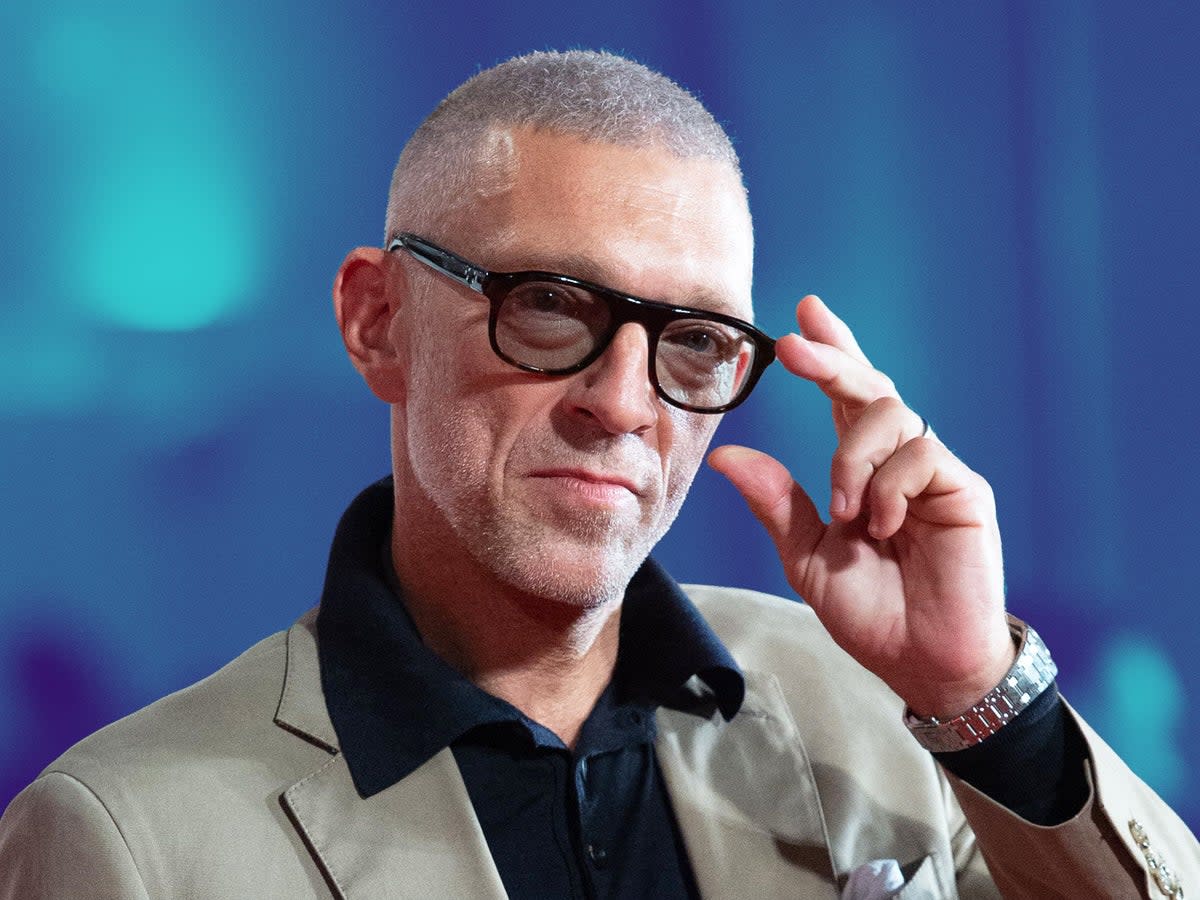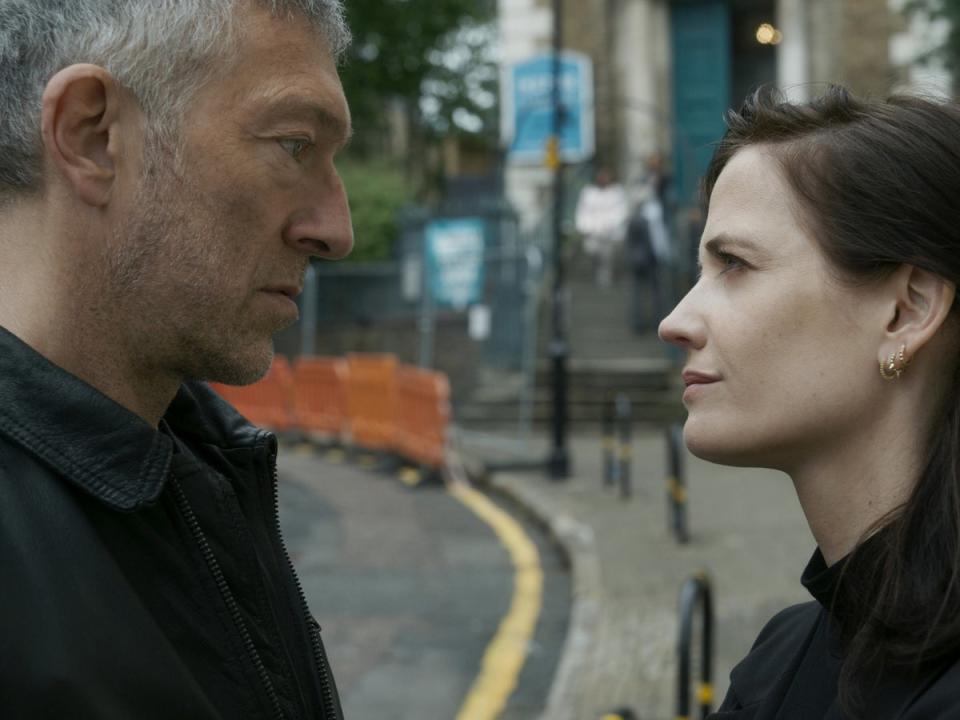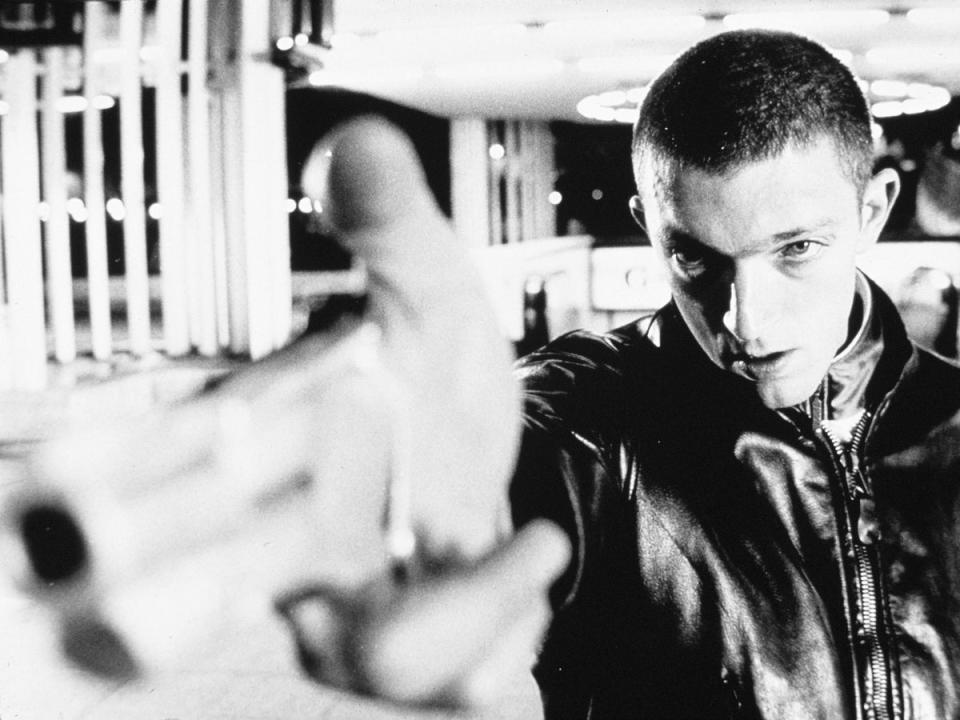Vincent Cassel: ‘Every time a man does something wrong now, he’s a pervert manipulator narcissist’

Vincent Cassel, the chameleon of French cinema, is not one for analysing his characters. In fact, he hates the very idea. When we meet over video chat, he mentions Michel Simon, the “wonderful French actor from the Thirties and Forties” who starred in classics like Boudu Saved from Drowning and L’Atalante. “When suddenly coming across an actor that would discuss the character and talk, he would go, ‘Ah, another intelligent actor.’ And that wasn’t a compliment! Because you don’t have to be smart to be an actor. You have to be able to let yourself go.”
Now 56, the wiry, scruffily handsome Cassel has been doing exactly that for his entire career, ever since he shocked audiences as the combustible Vinz in 1995’s Parisian riots drama La Haine. Since then, he’s never been afraid of courting controversy, notably in Gaspar Noé’s still-shocking 2002 rape-revenge drama Irréversible, one of several films he made with his ex-wife (and the mother of his two older daughters) Monica Bellucci.
In the flesh, Cassel is charming and open; on screen, he does deranged like nobody else. Think Sheitan (in which he played an insane shepherd) and Our Day Will Come (where he played an anarchic psychiatrist seeking vengeance for all redheads). Or his role as Natalie Portman’s tormentor-in-chief in Darren Aronofsky’s cryptic ballerina tale Black Swan – one of several times when Hollywood has come calling for him.
What he doesn’t do, he says, is politics. “Honestly, I’m not trying to participate in projects that are political or social at all,” he says. “I’ve been involved with stuff because they were interesting projects when I came across them... but I’m not trying to be social or political. Actually, I think when actors start to make choices like this, it gets a little boring, you know? Because moviemaking is not about changing the world. Come on! It would be very naive to think like that! There’s not one example of a movie that changed anything.”
That’s an argument with which others might disagree. He does concede that some films, like La Haine, tap into the zeitgeist momentarily. But more movies, he says, hold up mirrors for self-reflection. “It would be more how it challenges you as an audience [member]. What you think about a character, the way you judge the character or like the character... [that] tells you more about yourself.”
He mentions 2015’s Mon Roi, a Cannes prize-winner that traced a tumultuous marriage. The movie was directed by female filmmaker Maïwenn, and shown from the perspective of Emmanuelle Bercot’s spouse. His character was the husband from hell. “I’ve seen women get crazy, calling me – then him, by extension – a manipulator, a narcissist,” he laughs. “Yeah, it’s very trendy now. ‘Pervert manipulator narcissist!’ Every time a man does something wrong, he’s a pervert manipulator narcissist! I realised that, actually, these same people were really liking the character! If somebody has nightmares about a character because they hate him so much, for me it’s a compliment!”
His character in the classy new Apple TV Plus miniseries Liaison may not elicit bad dreams exactly, but he’s another shadowy figure from the underbelly, of the kind that Cassel so excels in playing. Set between London and Paris, the show is a political thriller that marks Apple’s first English and French (and Arabic) production. Primarily, it deals with a cyberattack on Britain. Cassel’s character Gabriel is a mercenary and a spy, essentially, who works for the French government – terminating, as they say in Apocalypse Now, with extreme prejudice.
I had to leave France and see it from afar to understand what France was really about
When he first read the script, he had an immediate, visceral reaction to Gabriel. “I wanted to make him more French, in the way he’s casual about things, about how he doesn’t take anything seriously,” he says. “Not like in a British way, like a James Bond, [with] nonchalance or whatever. He is deeply responsible. He’s seen the way it works behind the curtains, and he’s so dark and pessimistic that he has to play optimistic. He’s a very lonely character. That’s how I see it, and that’s what I wanted to come across.”
Cassel co-stars with Eva Green, who plays his ex-lover, Alison, who is now working for the English government. The show is directed by British filmmaker Stephen Hopkins, who previously helmed several episodes in the first season of the Kiefer Sutherland action drama 24. It’s certainly attempting to channel the same propulsive energy. It might also be the first Brexit thriller; the reason Britain is suddenly open to all these cyberattacks, we’re told, is its departure from the EU and subsequent failure to share information with its nearest geographical neighbours.
Cassel may not like to get political in his choices, but did he find that aspect of the show interesting? “I mean, of course, it’s interesting for everybody that was part of Europe, mostly,” he says. “Maybe it’s not as much as a subject [here in France] as it is for England, because you’re the one separated from the rest of Europe now. England was part of the same kind of market as we were, with such an access to the rest of the world... and now it’s not like that any more.”
Liaison isn’t Cassel’s first time on TV – he was a major antagonist in the third season of the now canned HBO/Sky Atlantic series Westworld. “The kind of money they put into the productions of streaming series has nothing to do with TV any more,” he says. “It’s definitely like movies, but let’s say on a smaller screen. I mean, personally, I don’t watch things at the cinema. They end up on my computer, my iPad, my home cinema or my big TV screen, whatever. So I don’t really see the difference.”

Cassel is unsentimental about the decline of cinemagoing, which is something of a surprise given he’s got moviemaking in his blood. Cassel’s mother, Sabine Litique, was a journalist, but his father, Jean-Pierre Cassel, was a prominent actor who worked for the likes of Luis Buñuel (in The Discreet Charm of the Bourgeoisie) and Sidney Lumet (in Murder on the Orient Express).
Inevitably, Cassel drank it all in. “I saw my father as an actor, and he was a happy actor, meaning that he was having fun, he was dancing, he was singing, he was on stage or shooting movies. He was a king, then he was a peasant, or a doctor. He was really enjoying what he was doing. So when you see your parents [be] happy with what they do – having a good life – it’s a wonderful way [to be].” Cassel’s first ever training was in a circus school, again inspired by his father. “My father danced a lot. He was called ‘the French Fred Astaire’. I guess, through him, I had this taste for movement.”
He hasn’t stopped moving since. Cassel recently completed back-to-back film adaptations of perennial swashbuckler The Three Musketeers, again with Eva Green, in which he plays Athos (his father featured in a 1970s version, directed by Richard Lester). Soon, he’ll be flying to Toronto to start shooting The Shroud, the new film from horror master David Cronenberg. “I’m already working on my English for this,” he promises.
Cassel has worked twice before for Cronenberg, in his Freud-Jung story A Dangerous Method, in which he played anarchistic patient Otto Gross, and in Eastern Promises, as the volatile son of a former Russian mafia boss. But whatever happened to the latter’s long-mooted sequel? “[Cronenberg] had a wonderful script,” Cassel sighs. “We were ready to do it and I don’t know why it collapsed. Now I don’t think it will happen any more.”

Also on his slate is the new film from Argentinian filmmaker Pablo Agüero, but Cassel is no stranger to South America. He’s spent years going back and forth between France and Rio with his second wife, model Tina Kunakey, whom he married in 2018 (they have a young child, Cassel’s third daughter). He’s also filmed a number of movies in Portuguese, like the true citizen of the world he is.
“To go and live in other places and to learn other languages gives you a better perspective on the world, of course, but [also] on your own country,” he says. “I had to leave France and see it from afar to understand what France was really about. I feel I understand more the mechanism of France since I’ve been away. The more you travel around, the more you change your perspective on everything.” Vive la différence, you might say.
‘Liaison’ is streaming now on Apple TV Plus, with new episodes dropping every Friday

